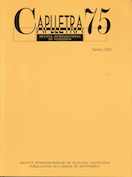The subordinate characterisation of female characters in the contemporary legend and related genres
DOI:
https://doi.org/10.7203/caplletra.75.26833Keywords:
folklore, netlore, legend, literary characterisation, female characters Abstract
Abstract
This paper analyses the characterisation of female characters in ten texts from the Folklore Archive of the University of the Balearic Islands that can be ascribed to different narrative genres that fall within the orbit of the legend: the contemporary legend, the antilegend, the hoax, the joke and the traditional letter. The characterisation of the female characters in these texts is resolved in two ways: on the one hand, they appear as victims of a male aggressor and, on the other, they play the role of aggressors, promiscuous or liberated women who govern their own destiny. In both cases, however, the resolution of the conflict in the story reveals the subordination of the female main characters to the patriarchal framework and the hegemonic male pornographic imaginary.
 Downloads
Downloads
Downloads
Published
How to Cite
-
Abstract190
-
PDF (Català)238
Issue
Section
License
Authors submitting work to Caplletra for publication must be the legitimate holder of the usage rights. Legitimacy for the purposes of publishing the work must also include images, tables, diagrams and any other materials that may complement the text, whether they are the author of such material or not.
Copyright: on publishing their work in the journal, the author grants Caplletra. Revista Internacional de Filologia usage rights (reproduction, distribution and public communication) for both the paper printed version and for the electronic version.
All work published in Caplletra is covered by the Creative Commons license type Attribution-NonCommercial-NoDerivatives 4.0 (CC BY-NC-ND 4.0).
RESPONSABILITY
Caplletra. Revista Internacional de Filologia does not necessarily identify with the points of view expressed in the papers it publishes.
Caplletra. Revista Internacional de Filologia accepts no responsibility whatsoever for any eventual infringement of intellectual property rights on the part of authors.






